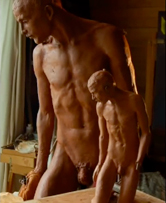Assisi
I love the name of the place as much as the name of the man. It has become
over my lifetime synonymous with the ideals to which he aspired as I
perceive them. Simple, uncluttered and spontaneous compassion, and service
to the weak and vulnerable.
I first made a pilgrimage en route from my home in Africa to America,
ironically to Mormon Zion. But being me, I purchased a used Lambretta motor
scooter and rode south on my meandering way from my stop in England, and on
through several countries and the Alps to that hillside town. The beauty of
the place seemed so consistent to me in the beauty of the man Fransisco who,
somehow because he was so young, when he became enlightened to the plight of
the vulnerable, always remains for me a sort of man-boy. Being still naïve
myself, it is easy to comprehend. I suppose I suspect that he retained a
child-like view of life, an innocence that refused corruption of dogma and
institution.
And now decades later I found myself making another sort of pilgrimage to
this man, this time exploring a few moments in time of an imagined encounter
he has with a wounded hare. But my purpose is to encapsulate a vision in
those few moments that portrays the essence of a life. So I worked for weeks
on a maquette, later to create a full life size version, and I have become
immersed in the essence of that man. It was something of a surprise to me in
a bit of my reading, though of course it should not have been, to find that
he is seen as the environmental saint by Catholics. When I first went to
his town, that word would have seemed odd for him, much too scientific, too
glib in a way.
As I worked on this sculpture starting from a very small wax sketch, it was
in the gesture of the body that I felt Francis. I placed him crouched on his
knees. He does not directly face the animal but turns slowly with exquisite
tenderness, with sprung tension in his body. The weeks of subtle changes and
adjustments gave me more and more insight. I became this man in a way, which
is, I suppose, one of the strange mystical byproducts of the artistic
experience. It became clear for me that he would understand the nature of
the animal, its natural fright, fear of man, its vulnerability. The same
would have been true for a wounded human he might encounter. He restrains
himself understanding that an animal in such a plight could as easily expire
from fright as its wounds. And it might lash out with its claws in defensive
terror. Thus he kneels alongside but away from the animal. He is bent in
quiet restraint as if to diminish himself. He quietly pulls part of his
raiment off and is poised to place it over the creature. His right arm is
held close to his side, fingers just beginning to reach out, gently,
reverently, respectful of the wildness of this animal. He might have a
romantic view of nature, but he is no fool. It is in his reverence that his
strength and understanding dwell. Trust is earned. He would enfold the
animal into the garment, draw it to his bosom and allow the power and pace
of his strong heart to comfort and calm the frantic pounding heart of the
animal. It is an embrace of pity and love, of strength and healing that
might precede any specific act of healing. This is the essence of the man
Francis to me, and also the sculpture I have rendered.
| 